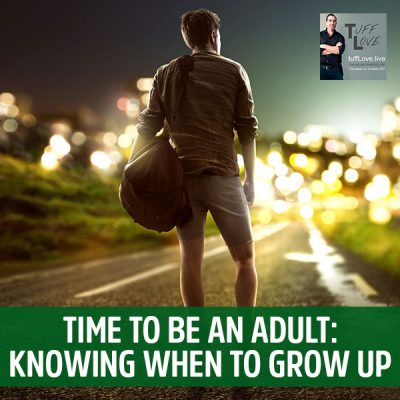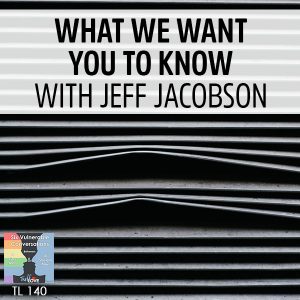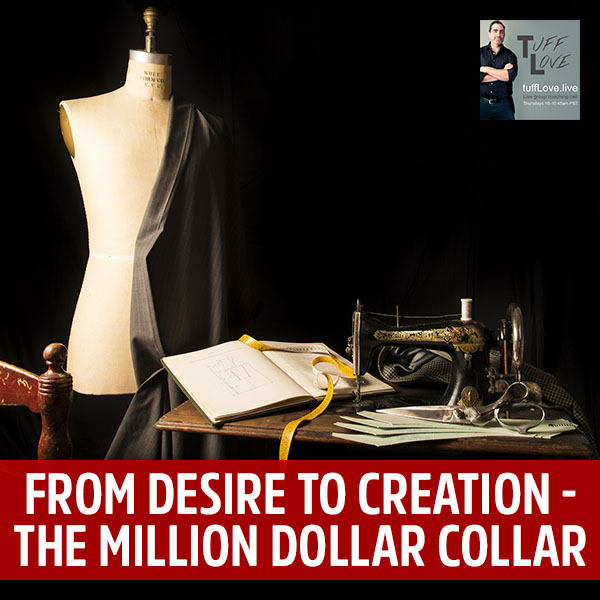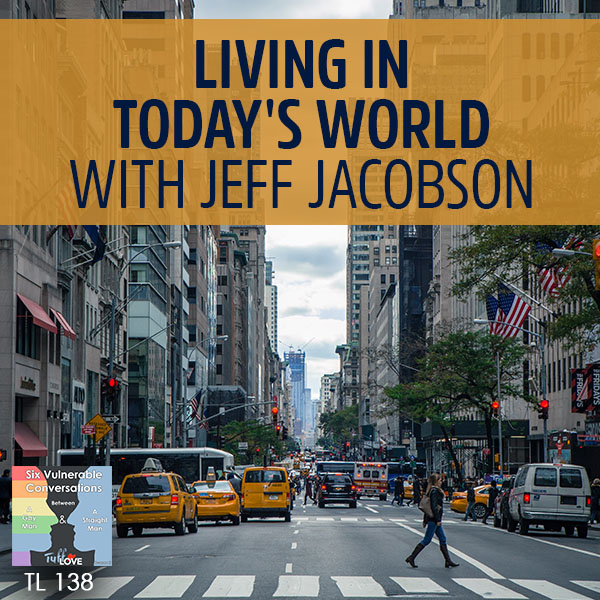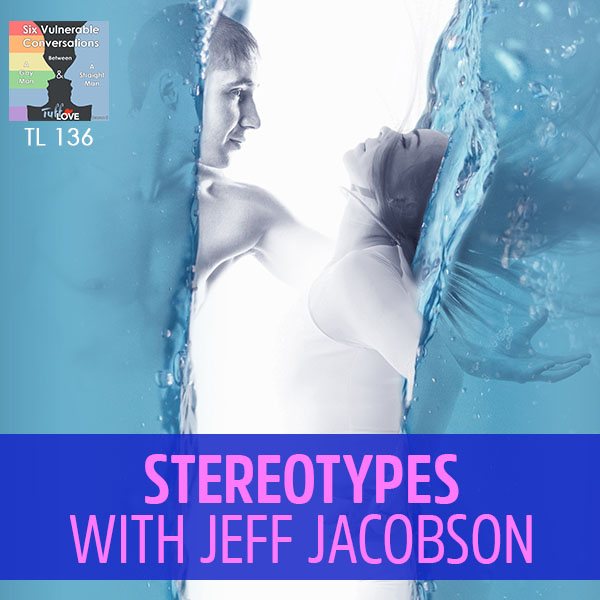
136: Six Conversations 3.4 – Stereotypes
May 25, 2018
As a man born of this society, my mind is filled with thousands of misconstrued gay stereotypes, having absorbed this from mainstream media portrayal of gay culture since the day I first started watching TV. Upon closer inspection, 95% of these stereotypes are probably incorrect. But what if they are correct? Are there stereotypes that gay men have of their straight counterparts? In show four of Six Conversations Season 3, Robert and Jeff discuss the numerous stereotypes linked to each other’s sexual orientation. Heterosexuality is so normative in our society that straight men get a free pass. They’re not prejudged while gay individuals are significantly judged solely based on their sexual orientation. Then there’s internalized homophobia, which is a gay man’s hatred of himself for simply existing – like a queer person reacting to queer exposure. It’s terrifying, but it’s the truth. Let’s take a look into the hilarious, honest, and sometimes heartbreaking stereotypes about America’s hetero and homosexual bubble.
—
This is Six Vulnerable Conversations between a straight man and a gay man. Myself and my good friend, Jeff, continue our conversation in depth and inquiry into each other on the concepts of the difference between heterosexual and homosexual in today’s America and beyond. We’re talking about the concept of stereotypes and the vast differences between what I grew up with and what he grew up with. Not so much where we grew up with, but how our response to stereotypes and as we got older, how they were so different between a straight man and a gay man. That’s the concept of the show. For more shows, please visit RobertKandell.com.
136: Six Conversations 3.4 – Stereotypes
This is show four, Season Three of Six Vulnerable Conversations. This one is between a straight man, me, and a gay man, Jeff. Jeff, welcome back to the show.
Thanks for having me back yet again.
Episodes one and two are out there in the world. My mom says hello. She enjoyed show number two, which was a bit saucy.
Hi, Mrs. Kandell.
She’s number one fan. I don’t know if you remember, but there was a lot of graphic stuff in show number two. There was talking about sex and then she’s like, “I didn’t know you had your ear drum blown out that story,” and I was just like, “Yes, that’s a lot.” If I can have my mom listen to this stuff then I am aces for the rest of the world. Any feedback or any thoughts? I know you listened to show number one, you just said.
I enjoyed it. I found it fascinating. I hope other people do too. This is the reason why you did this. I haven’t heard this kind of conversation before. If I can be objective about it, it’s like, “Fresh stuff, epic.”
Show four is around stereotypes, which we know we’ve bounced upon in the first three shows, but I want to focus on it to get it nailed down. It’s one of the main causes of this chasm between hetero and homosexual people is we have these ideas about who we are. The basis of the show is get down to the truth of who we are rather than the stereotypes.
Which takes some ferreting out and digging through.
Let’s compare 1980s because we’re about the same age. 1980s stereotypes have changed from 2018 stereotypes for male gay people.
Do I think they’ve changed?
Yes.
Part of me says no. In a way, sometimes I think that we’ve taken the standard, campy, faggoty flighty, overly emotive stereotype, which is one of the main ones of a gay man. Now it’s blasted all over social media, movies and TV shows. Some of that’s changing because you can see more real queer characters in the media. In the ‘80s, I didn’t see as many. It was hinted at but I didn’t see as many. I went on a tour of the LA LGBT Center because I’m doing the AIDS Ride. They were talking about there are 6,000 homeless teens in the area around the LGBT Center. Not greater LA but that part of West LA. 6,000 homeless teens, 40% of them are queer, identified. A lot of these kids look on TV, especially the gay men that are portrayed are well-dressed, have lots of money, look great, are smart and they feel less then because they’re not adding up to that. On the other hand, I do think it’s changing because we’re seeing more and more different kinds of gay men represented. Part of me thinks it’s the same old shit more widely distributed.
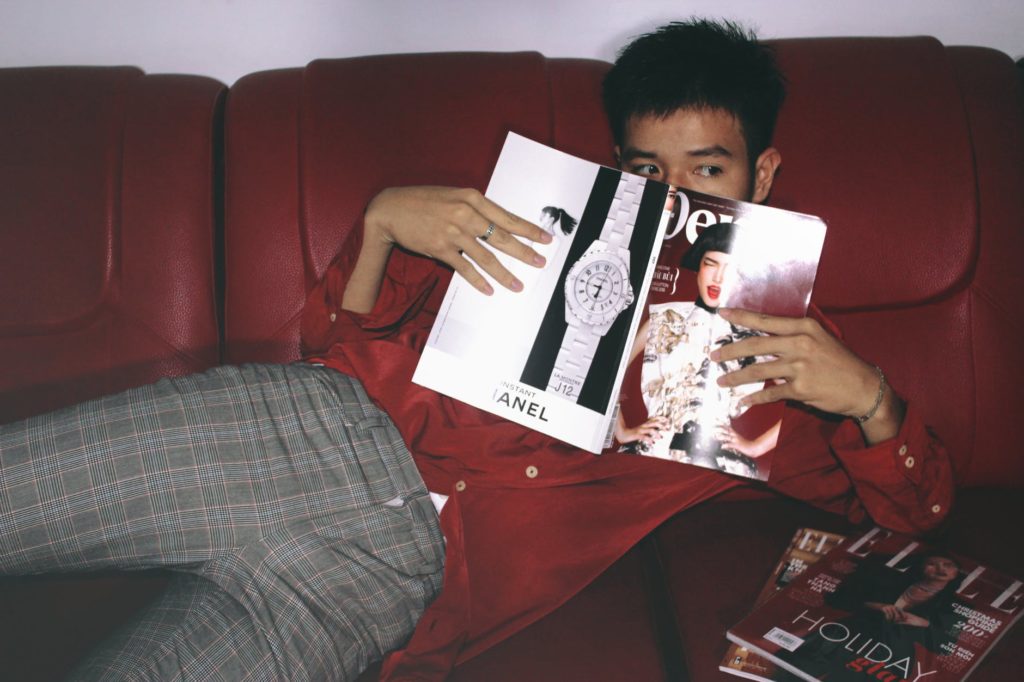
Homo And Hetero Stereotypes: Have more queer people in charge of the creative process and you’ll see more regular queer people.
In 1980s, there were some gay characters but not many. It wasn’t prevalent. Since the 40 years of that time or 30 years, you’re seeing more gay characters, a larger range of gay characters. Yet the stereotypical emotive, wearing bright colors, fashionably-dressed is still being used as a default.
What about you if you take the same question? What do you think of stereotypes back then in the ‘80s versus now?
There’s been a significant change and we’re talking about white, straight men. That little demographic known as white, straight men. I think they’ve taken a beating in the 40 years. What we’re seeing is guys used to be empowered, used to be in charge, the action hero, the man who wears the pants, the leader of the family. Now they tend to be goofy. They tend to be characters of themselves and they’re allowing more women into power positions and guys are starting to seem a little more goofy is probably the word that pops in my head. What’s your perspective on that vision?
Can they treat you like an oaf?
Yes. I’m not sure what that is, but you can anyway.
Part of me thinks if they have five more men shown that way than straight, white men might be saying, “Look how badly were being portrayed.” I still don’t see that. I still see white men definitely in charge. There’s a wider range of white, straight men in media. Maybe a little bit more of like, “Let’s dumb them down a little bit,” or, “Let’s have other minorities have power.” I still think that instead of 99% of everything, they’re 97% of everything.
I’ve been noticing this. I watch CNN because it’s fascinating. It’s fascinating because it’s such an interesting take and there are a lot of women anchors. Sometimes I think there’s even more women anchors than male anchors. Not the sidekick anchor of the ‘70s and ‘80s, like some badass babes running the CNN. Then again the biggies, Anderson Cooper and the guys are still the guys. I guess I can see your points.
I bet you and I are in very different perspectives on this. To me, sometimes it feels like just a few more drops in the bucket, but for you maybe because you’re in that demographic, you might sense more than I do with shifting and how it’s portrayed. I always have an assumption like, “That’s going to be the guy in charge. That’s going to be the most important person.”
Without even understanding the scene, I’m hearing you see as the tall white guy as the guy in charge. That’s your stereotype.
When you said Anderson Cooper, it’s like, “Yeah,” but I see it’s a tall, straight, white guy.
Anderson Cooper, isn’t he gay?
Yes, he’s gay. To see an anchor woman in charge of a segment or to see somebody who’s a minority or in a smaller population in charge of a scene, it still stands out to me as an exception.
I can see that. It’s new; I would say my vision around this is less than five years old, if not sooner. I’m noticing this difference.
It would be interesting to see data. Unfortunately, I do not remember the data but a friend of mine’s a filmmaker, she’s a director. She has data about how often women are portrayed in scenes in movies where they’re not talking about men, their weight. It’s so small. It’s so sad.
This for sure, I’ve seen.
I wonder about other data like that.
This is what the book is about and this is what I’ve been studying a lot. There’s been a shift in the last twelve months. That’s the time I’ve been studying it where they can’t find enough women directors after Wonder Woman and Patty Jenkins. After Patty Jenkins did Wonder Woman, look at what she did and now the studios are like, “We better find more women directors.”
One of the things I love about that movie and what Patty did is she showed Hollywood that a woman directing a movie about a woman could make a bucket load of money, which is obviously going to get people’s attention. I noticed this dubious part of me that’s like, “Now they’re listening.” David Letterman has a new show, he had Tina Fey on. Did you see it?
I didn’t see it but I read about it and I wanted to watch it.
It’s great, I love it. Maybe we’re thinking about the same point. I appreciated David Letterman saying, “We didn’t have many or any women writers. I didn’t even think about it.” He was admitting his privilege, ignorance or whatever. He said something like, “I wasn’t even sure if there were women that wanted to write for the show,” and she, without missing a beat, looks at him and she said, “Trust me, they did want to write for your show.” I didn’t think she wasn’t trashing him and he didn’t lose status but I hope it was an eye opener for him.
Almost to double back or go against what I said, there’s many more depictions in the media of people doing whatever they’re doing in a TV show or movie, and then they also happen to be queer. That to me is a nice change. The queer to them isn’t the main part of that character. In Shonda Rhimes stuff in How to Get Away with Murder. You’ve got this main gay character and that’s not the main part of the show. He’s a lawyer and he’s a little dubious. In a way, I think that’s changed from the ‘80s because if somebody was going to be gay, that’s all there was to them. It was only a color or flavor that was portrayed.
The next thought I had was we are seeing more options for media. If you think about now we have the Netflix, we have the Amazon, we have the STARZ, we have the Hulu. There’s all these different possibilities, we used to have the major movie markets. Now Netflix is spending a significant amount of revenue on originals.
There so much more non-traditional content. They can. You don’t have the censorship or the boards of directors that they have to answer to as much. It’s interesting when you were saying that I was also thinking of YouTube and Snapchat and some of these Instagram stars and YouTube stars, a lot more queer characters have their own channels and their own fan base. It’s direct from the creator to the consumer. I have to remember that that media is going on and is probably changing stereotypes way more than movies or TV shows.
All in all, we agree that there is a change though it’s slow and minute. I’m in agreement with that viewpoint. I’ve been looking for change and I don’t think if I looked for change, someone like you who just sees the hetero normal narrative runs the world doesn’t notice the significant difference.
Maybe or I’m impatient or I’m still looking for a queer character that isn’t pathetic. I love Stranger Things. Did you see it?
Loved it. Not the monsters, but that was how I grew up.
On bikes and we’re going to go do Dungeons & Dragons. Do you remember the character Barb?
Yes.
It’s the wallflower, unrequited love lesbian gets munched by the monster.
Was she a lesbian?
I think that’s how she was being portrayed coming out. I’m forgetting the name of the young woman that she had a crush on. There’s a character, you can tell she’s across but she’s not saying anything. I’m listening to Outlander. I’m listening to the audio books because friends have recommended it. I noticed I’m getting pissed off. It’s a complete straight love story. The sex between Jamie and Claire is amazing and it’s perfect. There’s a lot of bodice ripping, which drives me nuts. There is this main character, Captain Randall, and he’s a sadistic faggot. He’s a sadistic homosexual. I’m like, “Yet again, a perverted, disgusting, evil homosexual,” but it still sells.
You said the magic words, it still sells. There was a movie about a young man who was gay that came out this year.
My friend was telling me about. I haven’t seen it.
Simon.
Did you see it?
No, I haven’t watched it.
I don’t want to weigh in here because I didn’t see it. My friend said one of the things that she was thrown off by initially is that it was so not a big deal that he was gay. She was like, “No, it is. It should be made a big deal,” and then she thought, “Maybe this is what it is like or could be like.” It changed her viewpoint in terms of how she saw the character. I want to see it for that.
There’s a greater understanding, I’ve been told, by millennials, of Gen Z of alternative genders and sexual orientations.
It’s not as edgy. It’s more normalized. This can apply to women, to people of color, to queer folk, have more queer people in charge of the creative process and you’ll see more regular queer people. It’s always going to be through the straight white man’s eyes or straight woman’s eyes or whatever. It’s like, “We’re probably going to be a little limited.”
If they have an advisor who happens to be gay, they’re still going to override that for artistic, creative moneymaking.
Do you remember the movie Crash? It went out over a Bareback Mountain. There is an African-American actor who played a director of a sitcom that had either an all-black cast or had black characters in it. They were going through whatever they were going through and then the producers; they had more power than him, came in and said, “They don’t sound black.” Do you remember that?
Yes, I do.
Terrence Howard. He was awesome, and you see him rolling his eyes and having to go along with it. That struggle of the white people to say, “No, they don’t sound black enough.” Sometimes the straight world still wants to see us gay men as fun, as into musicals, as with life of any party. You are hinting at this but, I’m thinking about the stereotype of the straight white man now. Oftentimes, he’s portrayed as definitely the authority. Probably the one with the most chance of winning whatever it needs to be won or defeating whatever needs to be defeated. Sometimes through my eyes, the coolest, the most pigheaded, the least emotionally available, in some ways the dumbest.
If you think about movies, you can’t have a movie without conflict. The conflict is person against themselves, person against another person, person against nature. People versus people and then person versus nature. In the terms of conflict in most movies, I guess what we’ve often seen is white guy in charge and then white straight guy in charge. Another white guy who’s the underdog trying to prove a point against the guy in charge, the conflict. We see much of the dichotomy and the underdog usually has a best friend or a guide that helps them along the way, that’s usually white. It tends to be all white. We see the spectrum of it. You always see the straight guy in charge.
Whatever conversations are happening in that story, the ones between the white men are the most important. They’re the ones that have the most sway, the most interest, they get the most air time.
I can see that. Did you see 13 Reasons Why?
No, is that the one about the suicide? Is it good?
I loved it. It’s well done.
Does it fit in with what we’re talking about?
Yes. There’s the main character, Clay.
He’s the friend of the girl who committed suicide.
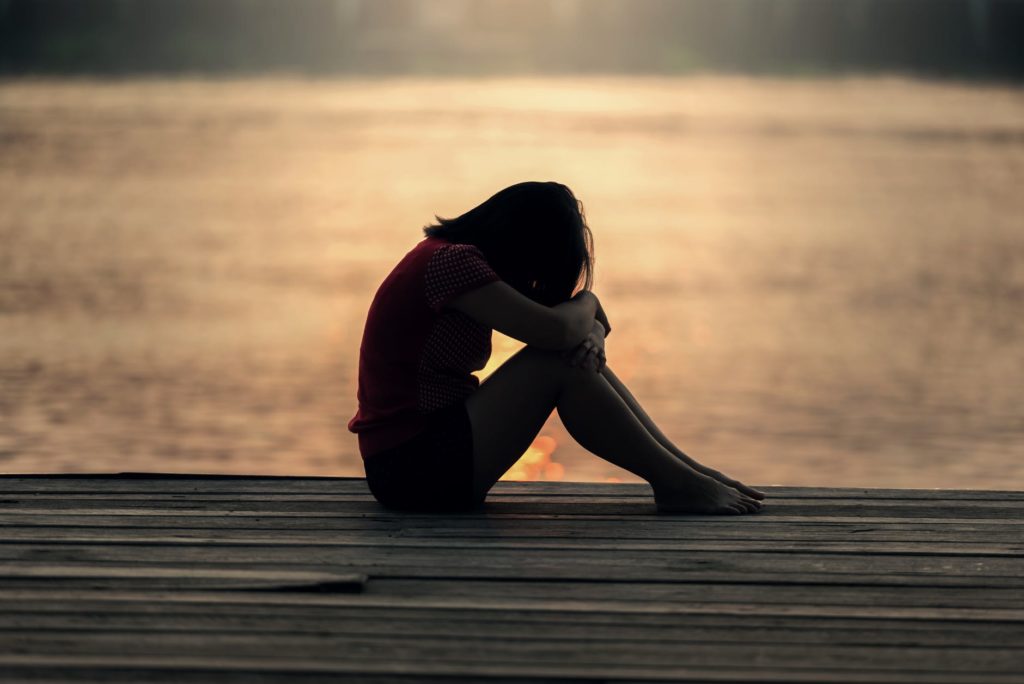
Homo And Hetero Stereotypes: People lie because we’re so afraid of being abandoned.
Yes, really well played. His guide is gay. The guy is Tony. Tony is his guide and he’s the smart gay guy. Like the wise, Jedi Yoda.
Does he have authority or is it still Clay gets the final say?
Clay is the protagonist. He’s the underdog, the guy everyone’s rooting for. He’s the heart. Tony’s the wisdom and Tony kicks ass in this movie. His act was good. He’s cool. He drives a Mustang. He speaks in tongues. He’s cryptic yet wise, powerful and knows everything. He’s always there at the right time. He’s a strong character.
Interesting and complex. I started watching Pretty Little Liars. I’m late to the party on this one. I was complaining to a friend on one of these long bike rides I’m taking. “I want to see more teen queer depictions.” She goes, “Check out Pretty Little Liars. There’s this lesbian character or same sex attraction character.” This was seven years ago when the first season came out. I like how it’s depicted. It’s fun fluff, but it’s these four friends in high school. One of them, Emily, has same sex attraction. It was like, “Look at that,” and she’s a woman of color. I don’t know where it goes after that but there is this young woman she gets a crush on, who’s also a woman of color. I’m like, “Look at that.”
Let’s go down to the nitty-gritty of stereotypes. People know the stereotypes well for gay man. We’ve talked about this before; we’re bringing up again on the show. It’s like gay man is connected to feminine. Feminine is connected to weak and needs the masculine to survive. Masculine, white straight guy, the stereotype, is powerful but disconnected from his feelings, disconnected from his feminine, I guess is a good way of saying it and clueless. That’s an interesting dichotomy. Straight is connected to the masculine. We’re talking about men here. Straight is connected to the masculine and gay is connected to the feminine.
We’re talking about man in terms of the straight and gay, and then the masculine, the feminine are the attributes for the qualities. We definitely agree with that.
Everyone has a mix of masculine, feminine inside of them. This is another example of the stereotype of the masculine fearing the power of the feminine.
As a straight man, one might be afraid of the power that a woman has when you could also be afraid of the power that a gay man has because he can represent that.
Because you might lose your masculinity.
That’s how it gets set up on, the fear is your masculinity will get taken away.
If you are gay or a faggot. Not to use your word. I know we have rules on it.
You can, rule’s free today. You can use it.
It’s a good thing. I used that word deliberately because it was a connotation of, “What you don’t want be as a boy is a faggot.”
I feel like I know how it works socially as kids and it’s probably ingrained in us. I noticed if I don’t try to be too smart, I sit back and go, “Are we really that scary?” It’s interesting to hear how women and gay men, I’m talking about all women and then the gay portion of men, can be belittled as unimportant and yet if we’re that unimportant and we can also completely emasculate you with our power, that’s confusing. We’re either weak or we’re a force to be reckoned with.
You might be weak in strength, in competition and all those masculine things, but you have sneaky, weer powers that will sap. You have a dagger as a woman’s weapon or poison as a woman’s weapon. Your gayness is the gay man’s weapon.
Versus a big, strong sword. We’ve hinted at this before but I’d love to know, what is it about that stereotype that is so threatening? In theory I get it, you could lose your masculinity. How does it specifically digest in you?
When I was younger, I was so dependent on external validation and proof that I was okay. I got tagged with a moniker of gay, pussy, faggot or anything of that connotation, anything feminine. I was extremely worried about how my peers would look at me. I was afraid of how my dad would look at me. I was afraid because I had lived in this stereotype of gay was weak. I lived in this place of abject fear of being misunderstood and basically abandoned.
Misunderstood, mislabeled, outcast and abandoned. I feel like I had those same exact fears for the same reasons. I wasn’t out as a teen, it’s like, “Separate myself away from anything that could look effeminate, faggoty.” What about now? If you’re not being grounded and open-hearted but if you think about any kneejerk reaction you may have, if there’s any of this fear in you, how does it operate?
I feel this podcast, this concept, all these conversations, the next one is going to be between me and a person of color or men of color.
Is that a woman of color?
A man of color. I’ll be doing one with color next. I reached out to a guy who’s awesome. We’ll see if he’s available. My point is, these conversations are an opportunity for me to lay all my cards on the table, to not have to wear any false fronts and then let people decide if they still like me or not. Knowing that I have the internal power and self-validation superpower than most people, especially men do not have. That I don’t need your approval for me to feel right about myself. My hope is that me modeling this as a straight person with lots of thoughts in my head, including my bi-curious thing I admitted in the first show, will enable people to stop hiding and start to tell the truth to the people they want to be intimate with. You don’t have to do a podcast. I’m not prescribing that. You don’t have to go on YouTube and say, “I’m bi-curious,” or, “I had this experience where the guys sucked my cock and blew my head off.” You don’t have to go to this level of extremity that someone like me does. Just the people you’re intimate with and people lie because we’re so afraid of being abandoned.
I know this is a subset of being abandoned, but another part is abandoned, attacked or killed. The abandonment part can sound a little gentle, it’s like it’s going to be left behind. You might get the shit beat out of you before that or lose your job, economic violence.
Our audience would think, “I would do a podcast and say I’m gay or bisexual,” you have to think about it. I have no status to lose. I’m always on the outcast and I’m hoping to make it into the mainstream with the book and the concepts. I have to do it authentically. A guy hits the mainstream with a book about men and I found out that someone else ghost wrote it, ghost writer and it loses it. It’s not him. I got the inside scoop about him too from a mutual friend also. He’s a jerk. The point is, I have to be authentic in who I am for me to say, “Let’s learn to be on unhidden.”
Let me talk about this racial thing that happened or racial awareness that happened for me the other day as a white guy. I’d be curious to bring it back and to see what, if any, equivalent there is for you and me. There were the two men who were arrested? The two African-American men who were arrested in Starbucks in Philadelphia. After that, although I found out about the second one first, was a fourteen-year-old who was in Michigan who was asking for directions. He missed his school bus and thought, “I can just walk.” It’s fourteen-year-old kid, he probably never paid attention to which way the vehicles went.
Got a little lost, asked for some help. Got pointed, walks a little bit more, got a little lost, stopped and ask at a house. He was yelled at and shot at. Fortunately, the bullet didn’t hit him. There was a dialogue going back and forth on Facebook about this. A guy that I know, he’s African American posted this and we were talking about it. I said how mad I was in the Starbucks incident, how mad I was at the police force, “Why was that okay that they arrested the guys?” I feel this is coming out more amongst white people but I’m waking up to this and I’m embarrassed that I’m just waking up to this. He said, “Basically, if you own a Starbucks, that’s your private business. You can say who is served and who isn’t.”
If you called the police state, they were just doing their job. That idea of white people calling the police on black people or people of color, as a thing, I had never thought about it before. It wasn’t like I didn’t know individual incidences but that it was a thing, a racial tool. I’m once again, I’ll use that phrase that I used, late to the party on this one. Once he said it, I could see it but I hadn’t thought about it nor I haven’t had to think about it. I feel pretty confident that if I was in a Starbucks and they wanted me to leave and the cops came, I have enough privilege where I probably wouldn’t be taken out handcuffed, let alone probably not even arrested.
I’m saying that because I feel like what you’re trying to do brilliantly is to lay your cards on the table. I’m wondering if there’s anything like that, your equivalent of like, “I just realized that,” that gay men have to put up with all the time. The hard part is, I know you’ve thought about this a lot.
Are there realizations that you have about the struggle for being a gay? The struggle for somebody like me being a gay man that only are dawning on you or have dawned on you and you were embarrassed you didn’t know. Just like I was when they were talking about white people using police as a tool against people of color.
I don’t think so. The point is that I’ve been intrigued by it. I grew up on Long Island and then went to Southern Cal for school and hung out with all my hetero friends. When I went to Philadelphia, I was connected to a lot of gay and bisexual men who worked in this restaurant. The ones who tortured me that I liked. I liked them as people and I started talking to them. I’ve always been a curious person. When I created OneTaste, it was an opportunity for so many people to reveal their deepest, darkest desires and secrets, their fetishes, those parts of themselves. Some of them were hard to hear. We had this whole timeframe of doing BDSM with needles, piercing, electricity and all this intense play. My little, white heterosexual naïve was like, “My God.” Seeing that and being like, “Why do I have a charge at the opportunity to investigate it?”
I continue to get educated. One of my peers is a woman, Amy Jo Goddard, who’s an amazing educator when it comes to LGBT and gender dynamics. I had looked to her for education and I looked for her for wisdom. She heard me do a spoken word performance and I used the word tranny sex. I wrote a poem and it was about being bad. I said, “What do you do when you open up your secret box of desires? Is there orgies and threesomes,” and I said, “Tranny sex.” Later she’s like, “Bob, that wasn’t cool.” I was like, “What?” She’s like, “Because trans,” she gave me the scoop, and I was like, “Wow.” All I could say was, “Thank you.” My point is I continue to learn things but not so much new struggles.
Some things may be pointed out or you’ll catch a little thing, but it’s not the overall struggle.
I get it, it sucks. I’m hoping it gets better. I think there’s a percentage, like we’ve been talking about. We’re going from 1% good to 4% and a 3% good. We’re living in a bubble. We live in Los Angeles. We live on the West Coast. God knows what it’s like still in Texas and Midwest and all these things. People are still living in total fear.
Lack of exposure too. It’s one of the things that I appreciate about the coming out movement is people get to recognize their neighbors, their colleagues, somebody’s uncle or aunt, and it’s like, “I know them as a person first, not the label,” and then they may have to struggle a little bit to digest it or metabolize it but because they met the person first, the label doesn’t take over as much or it has the opportunity not to take over.
We are moving more electronic where people interacting more with their screens than they are with each other. People can hide behind those profiles to say whatever they want and they say nasty things.
Here’s another stereotype that comes to mind for gay men is that we’re pedophiles. We are not safe to take care of children, to babysit children. Don’t have us around your young children, as obviously boys. That stereotype does not want to die. I hate it.
Why do you think that stereotype arose?
I don’t know. Homosexuals, pedophiles, prostitutes, all jammed in together and I think there’s a stereotype that older gay men are going to want to prey on boys. When in reality it’s mostly straight men that are doing the preying on boys and girls. That’s not the stereotype. I know that there are well-intentioned people, the people that live on the left coast, not the ones that we were talking about who still would have a, “Would I have an older gay man babysit my son?” It’s still in there.
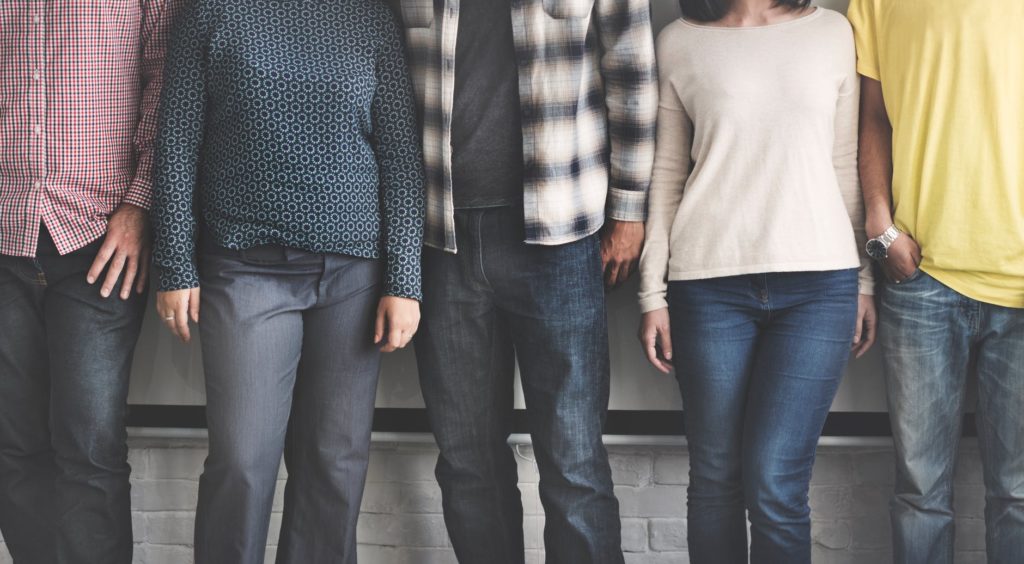
Homo And Hetero Stereotypes: One of the things that I appreciate about the coming out movement is people get to recognize their neighbors like, “I know them as a person first, not the label.”
I get it. Also, older white guys on young girls, there’s the compliment to that. We can’t control ourselves. We’re not in control of our senses when it comes to sexuality because we repress everything and we’re afraid of who we are. It’s an intense topic.
Somehow gay sex sends people to hell. The way we love can send you to hell. Not just the people doing it, but if we were around it or something, we could ruin your chances of eternal salvation, that’s a real lift me up.
Isn’t there like both pro-gay sex in the Bible and anti-gay sex in the Bible? There’s one that you shouldn’t don’t lay with your brother or something like that.
You mean you shouldn’t lay with your brother like a woman? You’re talking about the negative one.
That would be interesting because I remember hearing that there’s a pro-verse in the Bible.
Maybe in the Song of Songs where it’s very erotic. I would be surprised if it was in the Old Testament, like in Leviticus, you’ve got all these do not. We definitely get thrown under the bus. Since we’re talking about stereotypes, are you aware that you being depicted as possibly bi or gay could hinder you from wanting to pursue a man on man sex?
Me personally?
It’s the man having sex when another man’s present.
I don’t know what that block is. It feels like a foot on the brake when it comes to it.
Did you feel that right there when I said that?
Yeah, I imagined it. I’m not so worried about my reputation that I talked about before. I’m going to do, I’m going to talk about, I’m going to write about it, I’m going to take the ramifications of it. I’m not planning to run for office. I’m 48 years old at this point and I don’t need to go to school. I don’t need to get a job. I have my own company. I’m doing my own stuff for a long time. I don’t have to worry about anyone else’s opinion blocking me. I have my relationship with my wife, that’s very important to me but we’ve talked about all this stuff and she’s always curious if I find a guy cute or not.
That’s the level of communication that we’ve dedicated ourselves to. The answer’s no, I don’t fear it. Why doesn’t it happen? There are a lot of reasons. It’s not the way the setup my relationship right now. We’re not in places often where that’s an opportunity. We tend to isolate a little out there in the valley when it comes down to it. Hopefully, there’ll be more and more space for me to experiment in the future as things settle in our lives.
When you said the brake that gets put on, I guess I misunderstood you.
There’s a curiosity and I’m not talking so much in the last year or so. I’m talking the previous years. There’s a curiosity and then we’ve been to play parties. We’ve been to experiences, we’ve been to options and the play part is we tend to go to, a pretty hetero normal, but there’s always some opportunity to experiment. I had this memory of long time ago, four or five years ago and I was still at OneTaste. There was a party I went to with friends and then there was a couple of guys making out for this guy’s birthday. There was one moment I got the stare from the guy inviting me in because I was watching. It’s the beckon of me in and I chickened out hard.
Mostly probably because I was worried about my reputation because life was different back then because I was running OneTaste and I had a different title and a different je ne sais quoi about me. I remember that moment, I felt that pull in my stomach and walking away and going like, “Why did you do that? Why did you say no?” They were kissing and it wasn’t anything too intense. It could have been an incredible opportunity, that was the brakes I’m talking about, the lacking of propelling to try.
The extent to which straight men still may feel that these days is the extent to which we’re still not freed up around this topic.
If I was totally free, I’d be like, “Try it. What the hell.” There has to still be viewpoints inside of me. There has to be fear. There has to be parts of me that’s worried about the effect, the gay effect on me and what it’ll do.
The gay effect in how it makes you look. How you are esteemed by others.
All the women watching the guys make out; they were having a grand time. I would have lowered their viewpoints of me. I might’ve raised myself up in that little scenario.
Is it other men and other straight men that you fear most around that?
That’s probably true.
We were all raised to police against that, so that makes sense.
We focused on stereotypes. We had a lot of circles around it, which is interesting. This one should be called The Response to Stereotypes because it’s not just stereotypes; it’s the response of it.
We talked a little bit about what we see as a stereotype, but it’s definitely more how that plays out in our thoughts about it. I can hit you with a couple of direct questions. Do you have any like that for me?
No. In these terms, hetero sex is boring compared to this. What kind of question could I ask you? You’ve had both. You’ve admitted to enjoying both.
Internalized homophobia. My own hatred of my gay self. When you talk about internalized homophobia, it’s a queer person reacting to a queer exposure. Self-hatred is part of the continuum of it. I dated a guy who lived in San Francisco but I lived down in Monterey and then I moved up to San Francisco. That was the only time that I have lived in a gay ghetto because I lived right outside The Castro. It’s absolutely a gay ghetto, I’ve never lived before then or since then in a gay ghetto. What happened is after a while you get used to seeing guys holding hands and it’s mostly a gay male ghetto. Tons and tons of lesbians or trans folk at that point. I would go abroad for work or I would go on a business trip and I’d come back and I’d see two gay men holding hands on and you’d be like, “That’s weird.” My politics, they support this, support that. There’s this part of me that’s like, “Whoa.” It would take a couple of days to get used to it again. One can say, “Is that internalized homophobia?” It’s not like in that moment I thought they’re evil. I just thought that’s weird. That doesn’t match what I’m used to seeing. I had a reaction to it.
Have you ever met a straight guy and felt biased against him because he was straight? Not because of his personality.
I don’t think so.
Straight people meet gay people all the time and they have a bias without even knowing them, ”Just because they’re gay, we feel A, B and C.” The question is, as a gay man, have you ever met a straight guy and felt biased just because he was straight?
I don’t think so. I’m not trying to sound all holier than thou. I can’t think of a time when that happened.
That’s one of the biggest differences. Heterosexual is so normative in our society that we get a free pass so we’re not prejudged while gay individuals are significantly judged by their sexual orientation.
That feels like an interesting little litmus test. I’m sure you can think of times and I can think of times when both of us met a gay man where we had a bias. No, I can’t. I’m trying to imagine, “Look at that heterosexual, so straight.” I have to work at it but I don’t.
Remind the folks in our audience how people can find you.
JeffJacobsonWorld.com. That’s my website. Jeff@JacobsonWorld.com is my email address.
I’m RobertKandell.com to find out all the stuff that’s going down with Rob Kandell. Don’t hate me because I’m a straight man.
We couldn’t.
Thanks, Jeff. You rocked it.
You too. Until next time.
Thank you, Jeff, for being awesome because that’s who you are. I’m grateful to you and if you liked the show, want to give us a little loving, visit iTunes, Stitcher or your favorite podcast app and give us stars. Thank you so much. Have a great day. We’ll talk to you.
Resources mentioned:
- Jeff Jacobson
- Six Vulnerable Conversations Season Three episode one
- Six Vulnerable Conversations Season Three episode two
- LA LGBT Center
- AIDS Ride
- OneTaste
- Amy Jo Goddard
- JeffJacobsonWorld.com
- Jeff@JacobsonWorld.com
- Tuff Love on iTunes
- Tuff Love on Stitcher
Podcast: Play in new window | Download




